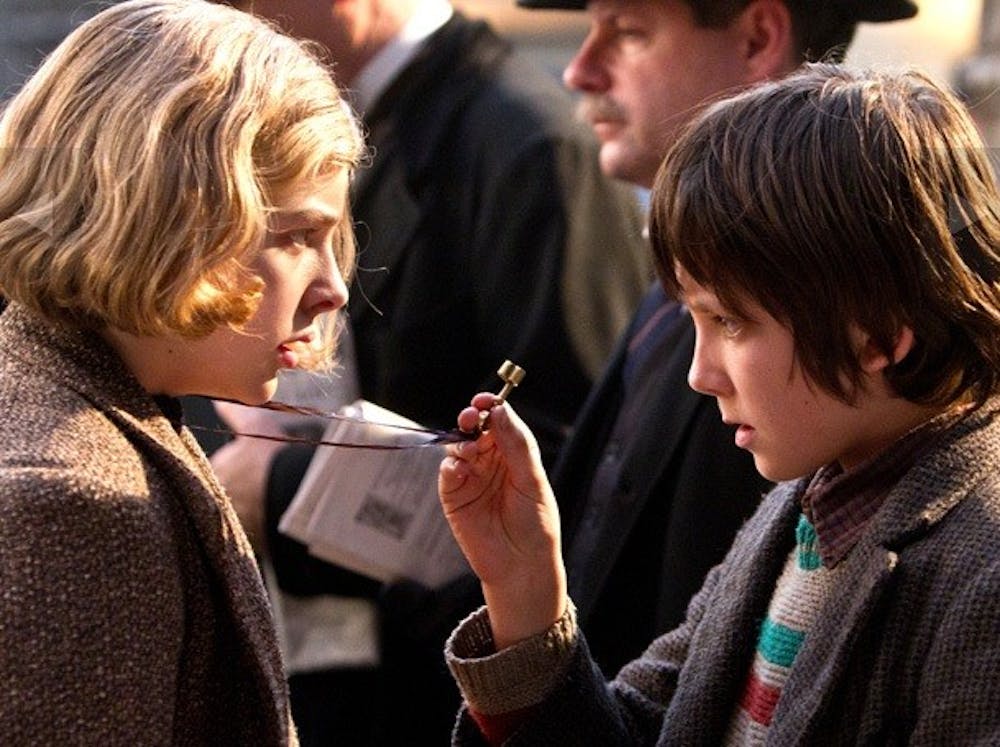The last place one would expect to see Martin Scorsese — the award-winning director best known for gritty mobster classics like Taxi Driver and Goodfellas — is in the business of 3-D children’s films. But with his latest project, Hugo, this is exactly where he went, and it works.
Hugo is set in the quintessential confines of a 1930s Paris train station — complete with classic French music and costume. Its protagonist, Hugo Cabret (Butterfield), is a young orphan who lives within the walls of the station after losing his father (Law), a clock-maker, to a fire. Neglected by his boozy uncle, Hugo spends his days secretly winding the clocks of the station, mesmerized by the idea of fixing what is broken, be it machine or man, and obsessed with keeping the memory of his father alive. One night, Hugo meets Isabelle (Moretz), a young orphan who lives with her godfather (Kingsley), the owner of a toyshop at the station. We later find that this introverted old man, referred to as Papa Georges, is none other than Georges Méliès, the prolific early 20th century filmmaker. The two children embark on a journey involving a secret held by an automaton, and try to uncover the connection between Hugo’s humanlike machine and Méliès’ past.
The station inspector (Cohen) serves as the antagonist within the film, providing comic relief throughout the otherwise dramatic and touching story. Whether his metal leg brace gets stuck to a moving train or he engages in awkward interactions with women, the inspector reminds the audience that this film, despite its honest tribute to film history and adult-revered director, is intended for children.
Scorsese brilliantly incorporates 3-D technology in an age when the line between elegant and excessive is a fine one. Twice within the film, viewers see an early-1900s audience jumping out of their seats while watching a film portrayal of a train heading their way. Ironically, and in what could be a critique on modern digital cinema, audiences today fail to even flinch as massive trains and growling dogs are hurled their way in the most realistic digital fashion we know. Among the artistically vivid 3-D images are countless shots that harp on rusty mechanical clock gears and hone in on human emotion, juxtaposing two key elements within the film — man and machine — to create an immersive experience, both visually and thematically. By the end, it becomes apparent that the use of 3-D technology serves to engross the spectator in movie magic much like Méliès did 100 years ago.
But behind the aerial excursion through Paris, the clock-tower chases, the drawings and the machines lies a more profound elegy to the foundations of cinema. Scorsese includes footage of movies that plaster film history textbooks today, from the Lumière brothers’ Arrival of a Train to William Heise’s The Kiss to Méliès’ A Trip to the Moon — one that plays a central role to the film’s plot and underlying message. The movies themselves are an adventure, one that allows imagination to manifest itself onto the screen. And within Hugo, the machines, the stories and the dreams of cinema all prove to be products of a young man’s imagination and curiosity, be it Méliès or Hugo.
Today, many mourn the alleged death of cinema. They eulogize and reminisce and, in doing so, don’t allow the history of film to truly die. “Time hasn’t been kind to old movies,” film professor Rene Tabard (Stuhlbarg) laments within the film. This, sadly, remains true, but Scorsese does a remarkable job in keeping the memory of early cinema — of its dazzle and inspiration and magic — alive. Hugo says the same of machines, of people and of cinema: If it’s broken, fix it. If it’s forgotten, remember it. It is a far cry from the take-away message of your typical children’s film, but one that both kids and adults can appreciate.
As Méliès says in the film and as Scorsese so eloquently puts it, “Come and dream with me.” Don’t mind if we do.
3.5/5 Stars Directed by: Martin Scorsese Starring: Asa Butterfield, Chloe Grace Moritz, Christopher Lee Rated PG. 127 minutes. See if you liked: Up (2009)







